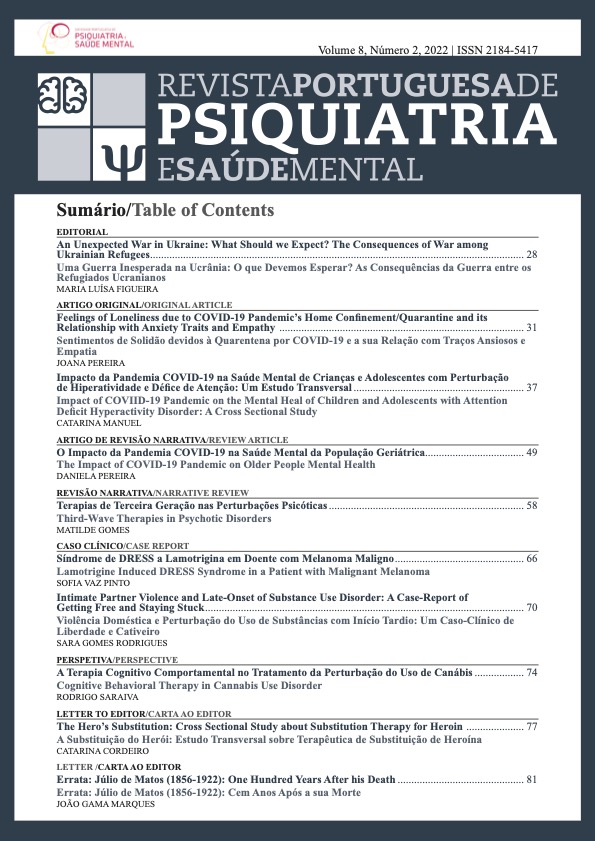Third‑Wave Therapies in Psychotic Disorders
DOI:
https://doi.org/10.51338/rppsm.319Keywords:
Cognitive Behavioral Therapy, Empathy, Mindfulness, Psychotic Disorders/therapyAbstract
Psychotic disorders are clinical syndromes that are characterized by difficulty in distinguishing internal experience from
external reality, with emergence of delusions, hallucinations and/or psychomotor disorganization. These symptoms are
often distressing experiences for the patient. Although these pathologies have a heterogeneous course, most patients
experience difficulties in psychosocial rehabilitation, with loss of self‑esteem
and quality of life.
Third‑wave
cognitive‑behavioral
therapies, developed in the last thirty years, have been extensively studied, with scientific
evidence proving their effectiveness in the treatment of various pathologies, such as depression, anxiety and chronic
pain. Although interest in the application of these therapies in psychotic disorders has developed more recently, there are
already several studies that demonstrate their usefulness in reducing psychotic symptoms and improving the well‑being
of patients with psychosis.
This review focuses on the contributions of mindfulness based therapies, acceptance and commitment therapy and compassion
focused therapy in the treatment of psychotic disorders.
Downloads
References
Langer, Á. I. et al. The effect of a mindfulness-based intervention in cognitive functions and psychological well-being applied as an early intervention in schizophrenia and high-risk mental state in a Chilean sample: study protocol for a randomized controlled trial. Trials 18, 233 (2017). DOI: https://doi.org/10.1186/s13063-017-1967-7
Böge, K., Thomas, N. & Jacobsen, P. Is mindfulness for psychosis harmful? Deconstructing a myth. The British Journal of Psychiatry 218, 71–72 (2021). DOI: https://doi.org/10.1192/bjp.2020.165
Dyga, K. & Stupak, R. Meditation and psychosis. A trigger or a cure? Archives of Psychiatry and Psychotherapy 17, 48–58 (2015). DOI: https://doi.org/10.12740/APP/58976
Walsh, R. & Roche, L. Precipitation of acute psychotic episodes by intensive meditation in individuals with a history of schizophrenia. American Journal of Psychiatry 136, 1085–1086 (1979). DOI: https://doi.org/10.1176/ajp.136.8.1085
Chadwick, P. Mindfulness for psychosis: a humanising therapeutic process. Current Opinion in Psychology 28, 317–320 (2019). DOI: https://doi.org/10.1016/j.copsyc.2019.07.022
Lucena-Santos, P., Pinto-Gouveia, J. & Oliveira, M. Terapias Comportamentais de Terceira Geração. (2015).
Hayes, S. C. Acceptance and commitment therapy, relational frame theory, and the third wave of behavioral and cognitive therapies. Behavior Therapy 35, 639–665 (2004). DOI: https://doi.org/10.1016/S0005-7894(04)80013-3
Pérez-Álvarez, M. Third-Generation Therapies: Achievements and challenges. Int J Clin Health Psychol 12, 291–310 (2012).
Herbert, J. D. & Forman, E. M. Acceptance and Mindfulness in Cognitive Behavior Therapy: Understanding and Applying the New Therapies. (2011). DOI: https://doi.org/10.1002/9781118001851
Hayes, S. C., Strosahl, K. D. & Wilson, K. G. Acceptance and commitment therapy: An experiential approach to behavior change. (1999).
Linehan, M. M. Cognitive-behavioral treatment of borderline personality disorder. (1993).
Kohlenberg, R. J. & Tsai, M. Functional analytic psychotherapy. (1991). DOI: https://doi.org/10.1007/978-0-387-70855-3
Jacobson, N. S. & Christensen, A. Integrative couple therapy: Promoting acceptance and change. (1996).
Segal, Z. v., Williams, J. M. G. & Teasdale, J. D. Mindfulness-based cognitive therapy for depression: A new approach to preventing relapse. (2002).
Gilbert, P. Introducing compassion-focused therapy. Advances in Psychiatric Treatment 15, 199–208 (2009). DOI: https://doi.org/10.1192/apt.bp.107.005264
Cullen, C. Acceptance and Commitment Therapy (ACT): A Third Wave Behaviour Therapy. Behavioural and Cognitive Psychotherapy 36, 667–673 (2008). DOI: https://doi.org/10.1017/S1352465808004797
Hayes, S. C., Villatte, M., Levin, M. & Hildebrandt, M. Open, Aware, and Active: Contextual Approaches as an Emerging Trend in the Behavioral and Cognitive Therapies. Annual Review of Clinical Psychology 7, 141–168 (2011). DOI: https://doi.org/10.1146/annurev-clinpsy-032210-104449
Kabat-Zinn, J. Mindfulness-based interventions in context: Past, present, and future. Clinical Psychology: Science and Practice 10, 144–156 (2003). DOI: https://doi.org/10.1093/clipsy.bpg016
Associação Portuguesa para o Mindfulness. O que é o mindfulness. http://apmindfulness.com/mindfulness.html (2021).
Böge, K. et al. Mindfulness-Based Interventions for In-Patients With Schizophrenia Spectrum Disorders—A Qualitative Approach. Frontiers in Psychiatry 11, (2020). DOI: https://doi.org/10.3389/fpsyt.2020.00600
Goldberg, S. B. et al. Mindfulness-based interventions for psychiatric disorders: A systematic review and meta-analysis. Clinical Psychology Review 59, 52–60 (2018). DOI: https://doi.org/10.1016/j.cpr.2017.10.011
Zhang, D., Lee, E. K. P., Mak, E. C. W., Ho, C. Y. & Wong, S. Y. S. Mindfulness-based interventions: an overall review. British Medical Bulletin 138, 41–57 (2021). DOI: https://doi.org/10.1093/bmb/ldab005
Grossman, P., Niemann, L., Schmidt, S. & Walach, H. Mindfulness-based stress reduction and health benefits. Journal of Psychosomatic Research 57, 35–43 (2004). DOI: https://doi.org/10.1016/S0022-3999(03)00573-7
Pepper, S. C. World hypotheses: A study in evidence. (1942).
Hayes, S. C. & Gifford, E. v. The Trouble with Language: Experiential Avoidance, Rules, and the Nature of Verbal Events. Psychological Science 8, 170–173 (1997). DOI: https://doi.org/10.1111/j.1467-9280.1997.tb00405.x
Martins, M. et al. Mindfulness e Compaixão na recuperação da psicose. (Pactor, 2020).
Gilbert, P. Compassion: Conceptualisations, research and use in psychotherapy. (Routledge, 2005).
Owen, M. J., Sawa, A. & Mortensen, P. B. Schizophrenia. The Lancet 388, 86–97 (2016). DOI: https://doi.org/10.1016/S0140-6736(15)01121-6
Lieberman, J. A. & First, M. B. Psychotic Disorders. New England Journal of Medicine 379, 270–280 (2018). DOI: https://doi.org/10.1056/NEJMra1801490
American Psychiatric Association. DSM-5. Manual de diagnóstico e estatística das perturbações mentais. (Climepsi Editores, 2014).
Millier, A. et al. Humanistic burden in schizophrenia: A literature review. Journal of Psychiatric Research 54, 85–93 (2014). DOI: https://doi.org/10.1016/j.jpsychires.2014.03.021
Gouveia, M. et al. The cost and burden of schizophrenia in Portugal in 2015. International Journal of Clinical Neurosciences and Mental Health S13 (2018) doi:10.21035/ijcnmh.2017.4(Suppl.3).S13. DOI: https://doi.org/10.21035/ijcnmh.2017.4(Suppl.3).S13
Gonçalves-Pinho, M., Ribeiro, J. P. & Freitas, A. Schizophrenia Related Hospitalizations – a Big Data Analysis of a National Hospitalization Database. Psychiatric Quarterly 92, 239–248 (2021). DOI: https://doi.org/10.1007/s11126-020-09793-8
Kuipers, E., Yesufu-Udechuku, A., Taylor, C. & Kendall, T. Management of psychosis and schizophrenia in adults: summary of updated NICE guidance. BMJ 348, g1173–g1173 (2014). DOI: https://doi.org/10.1136/bmj.g1173
Haddad, P. M. & Correll, C. U. The acute efficacy of antipsychotics in schizophrenia: a review of recent meta-analyses. Therapeutic Advances in Psychopharmacology 8, 303–318 (2018). DOI: https://doi.org/10.1177/2045125318781475
Dimidjian, S. et al. Considering Meta-Analysis, Meaning, and Metaphor: A Systematic Review and Critical Examination of “Third Wave” Cognitive and Behavioral Therapies. Behavior Therapy 47, 886–905 (2016). DOI: https://doi.org/10.1016/j.beth.2016.07.002
Bach, P. & Hayes, S. C. The use of acceptance and commitment therapy to prevent the rehospitalization of psychotic patients: A randomized controlled trial. Journal of Consulting and Clinical Psychology 70, 1129–1139 (2002). DOI: https://doi.org/10.1037/0022-006X.70.5.1129
Wang, L.-Q., Chien, W. T., Yip, L. K. & Karatzias, T. A randomized controlled trial of a mindfulness-based intervention program for people with schizophrenia: 6-month follow-up. Neuropsychiatric Disease and Treatment Volume 12, 3097–3110 (2016). DOI: https://doi.org/10.2147/NDT.S123239
Chien, W. T., Bressington, D., Yip, A. & Karatzias, T. An international multi-site, randomized controlled trial of a mindfulness-based psychoeducation group programme for people with schizophrenia. Psychological Medicine 47, 2081–2096 (2017). DOI: https://doi.org/10.1017/S0033291717000526
Chien, W. T. & Lee, I. Y. M. The Mindfulness-Based Psychoeducation Program for Chinese Patients With Schizophrenia. Psychiatric Services 64, 376–379 (2013). DOI: https://doi.org/10.1176/appi.ps.002092012
Tabak, N. T. & Granholm, E. Mindful cognitive enhancement training for psychosis: A pilot study. Schizophrenia Research 157, 312–313 (2014). DOI: https://doi.org/10.1016/j.schres.2014.06.002
Davis, L. & Kurzban, S. Mindfulness-Based Treatment for People With Severe Mental Illness: A Literature Review. American Journal of Psychiatric Rehabilitation 15, 202–232 (2012). DOI: https://doi.org/10.1080/15487768.2012.679578
Khoury, B., Lecomte, T., Gaudiano, B. A. & Paquin, K. Mindfulness interventions for psychosis: A meta-analysis. Schizophrenia Research 150, 176–184 (2013). DOI: https://doi.org/10.1016/j.schres.2013.07.055
Louise, S., Fitzpatrick, M., Strauss, C., Rossell, S. L. & Thomas, N. Mindfulness- and acceptance-based interventions for psychosis: Our current understanding and a meta-analysis. Schizophrenia Research 192, 57–63 (2018). DOI: https://doi.org/10.1016/j.schres.2017.05.023
Cramer, H., Lauche, R., Haller, H., Langhorst, J. & Dobos, G. Mindfulness- and Acceptance-based Interventions for Psychosis: A Systematic Review and Meta-analysis. Global Advances in Health and Medicine 5, 30–43 (2016). DOI: https://doi.org/10.7453/gahmj.2015.083
Jansen, J. E., Gleeson, J., Bendall, S., Rice, S. & Alvarez-Jimenez, M. Acceptance- and mindfulness-based interventions for persons with psychosis: A systematic review and meta-analysis. Schizophrenia Research 215, 25–37 (2020). DOI: https://doi.org/10.1016/j.schres.2019.11.016
Liu, Y., Li, I. & Hsiao, F. Effectiveness of mindfulness‐based intervention on psychotic symptoms for patients with schizophrenia: A meta‐analysis of randomized controlled trials. Journal of Advanced Nursing 77, 2565–2580 (2021). DOI: https://doi.org/10.1111/jan.14750
Li, Y. et al. Feasibility, acceptability, and preliminary effectiveness of mindfulness‐based interventions for people with recent‐onset psychosis: A systematic review. Early Intervention in Psychiatry 15, 3–15 (2021). DOI: https://doi.org/10.1111/eip.12929
Samson, C. & Mallindine, C. The feasibility and effectiveness of running mindfulness groups in an early intervention in psychosis service. The Cognitive Behaviour Therapist 7, e9 (2014). DOI: https://doi.org/10.1017/S1754470X14000087
Khoury, B., Lecomte, T., Comtois, G. & Nicole, L. Third-wave strategies for emotion regulation in early psychosis: a pilot study. Early Intervention in Psychiatry 9, 76–83 (2015). DOI: https://doi.org/10.1111/eip.12095
Tong, A. C. Y. et al. A Low-Intensity Mindfulness-Based Intervention for Mood Symptoms in People with Early Psychosis: Development and Pilot Evaluation. Clinical Psychology & Psychotherapy 23, 550–560 (2016). DOI: https://doi.org/10.1002/cpp.1981
Chadwick, P. Relationship to Internal Experience: Mindfulness Practice. in Person-Based Cognitive Therapy for Distressing Psychosis 58–97 (John Wiley & Sons Ltd, 2008). doi:10.1002/9780470713075.ch5. DOI: https://doi.org/10.1002/9780470713075.ch5
Chadwick, P., Taylor, K. N. & Abba, N. Mindfulness Groups for People with Psychosis. Behavioural and Cognitive Psychotherapy 33, 351–359 (2005). DOI: https://doi.org/10.1017/S1352465805002158
Shonin, E., van Gordon, W. & Griffiths, M. D. Do mindfulness-based therapies have a role in the treatment of psychosis? Australian & New Zealand Journal of Psychiatry 48, 124–127 (2014). DOI: https://doi.org/10.1177/0004867413512688








